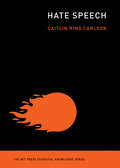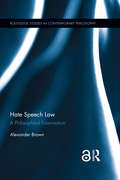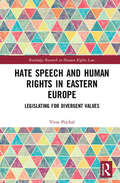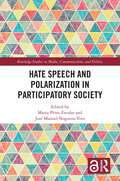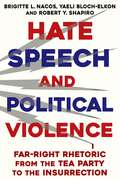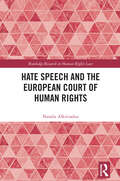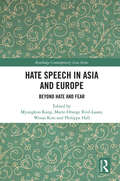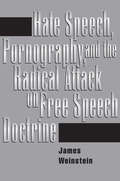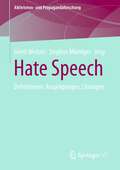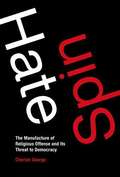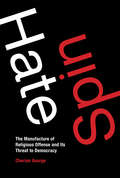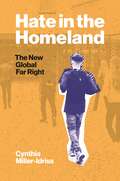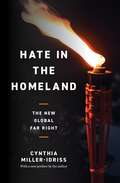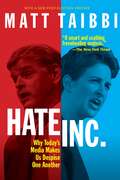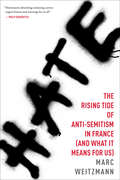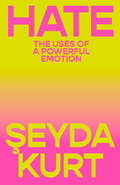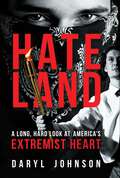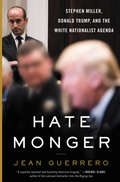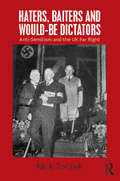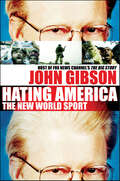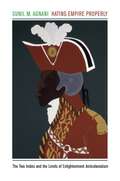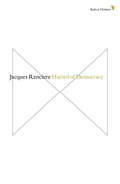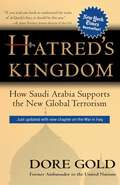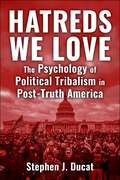- Table View
- List View
Hate Speech (The MIT Press Essential Knowledge series)
by Caitlin Ring CarlsonAn investigation of hate speech: legal approaches, current controversies, and suggestions for limiting its spread.Hate speech can happen anywhere--in Charlottesville, Virginia, where young men in khakis shouted, "Jews will not replace us"; in Myanmar, where the military used Facebook to target the Muslim Rohingya; in Capetown, South Africa, where a pastor called on ISIS to rid South Africa of the "homosexual curse." In person or online, people wield language to attack others for their race, national origin, religion, gender, gender identity, sexual orientation, age, disability, or other aspects of identity. This volume in the MIT Press Essential Knowledge series examines hate speech: what it is, and is not; its history; and efforts to address it.
Hate Speech Law: A Philosophical Examination (Routledge Studies in Contemporary Philosophy)
by Alex BrownHate speech law can be found throughout the world. But it is also the subject of numerous principled arguments, both for and against. These principles invoke a host of morally relevant features (e.g., liberty, health, autonomy, security, non-subordination, the absence of oppression, human dignity, the discovery of truth, the acquisition of knowledge, self-realization, human excellence, civic dignity, cultural diversity and choice, recognition of cultural identity, intercultural dialogue, participation in democratic self-government, being subject only to legitimate rule) and practical considerations (e.g., efficacy, the least restrictive alternative, chilling effects). The book develops and then critically examines these various principled arguments. It also attempts to de-homogenize hate speech law into different clusters of laws/regulations/codes that constrain uses of hate speech, so as to facilitate a more nuanced examination of the principled arguments. Finally, it argues that it is morally fitting for judicial and legislative judgments about the overall warrant of hate speech law to reflect principled compromise. Principled compromise is characterized not merely by compromise over matters of principled concern but also by compromise which is itself governed by ideals of moral duty or civic virtue (e.g., reciprocity, equality, and mutual respect). The Open Access version of this book, available at https://doi.org/10.4324/9781315714899, has been made available under a Creative Commons Attribution-Non Commercial-No Derivatives 4.0 license.
Hate Speech and Human Rights in Eastern Europe: Legislating for Divergent Values (Routledge Research in Human Rights Law)
by Viera PejchalHate Speech and Human Rights. Democracies need to understand these terms to properly adapt their legal frameworks. Regulation of hate speech exposes underlining and sometimes invisible societal values such as security and public order, equality and non-discrimination, human dignity, and other democratic vital interests. The spread of hatred and hate speech has intensified in many corners of the world over the last decade and its regulation presents a conundrum for many democracies. This book presents a three-prong theory describing three different but complementary models of hate speech regulation which allows stakeholders to better address this phenomenon. It examines international and national legal frameworks and related case law as well as pertinent scholarly literature review to highlight this development. After a period of an absence of free speech during communism, post-communist democracies have sought to build a framework for the exercise of free speech while protecting public goods such as liberty, equality and human dignity. The three-prong theory is applied to identify public goods and values underlining the regulation of hate speech in the Czech Republic and Slovakia, two countries that share a political, sociological, and legal history, as an example of the differing approaches to hate speech regulation in post-communist societies due to divergent social values, despite identical legal frameworks. This book will be of great interest to scholars of human rights law, lawyers, judges, government, NGOs, media and anyone who would like to understand values that underpin hate speech regulations which reflect values that society cherishes the most.
Hate Speech and Polarization in Participatory Society (Routledge Studies in Media, Communication, and Politics)
by Marta Pérez-Escolar José Manuel Noguera-VivoThis timely volume offers a comprehensive and rigorous overview of the role of communication in the construction of hate speech and polarization in the online and offline arena. Delving into the meanings, implications, contexts and effects of extreme speech and gated communities in the media landscape, the chapters analyse misleading metaphors and rhetoric via focused case studies to understand how we can overcome the risks and threats stemming from the past decade’s defining communicative phenomena. The book brings together an international team of experts, enabling a broad, multidisciplinary approach that examines hate speech, dislike, polarization and enclave deliberation as cross axes that influence offline and digital conversations. The diverse case studies herein offer insights into international news media, television drama and social media in a range of contexts, suggesting an academic frame of reference for examining this emerging phenomenon within the field of communication studies. Offering thoughtful and much-needed analysis, this collection will be of great interest to scholars and students working in communication studies, media studies, journalism, sociology, political science, political communication and cultural industries.
Hate Speech and Political Violence: Far-Right Rhetoric from the Tea Party to the Insurrection
by Brigitte L. Nacos Yaeli Bloch-Elkon Robert ShapiroHow did the United States descend into crisis, with institutions frayed, political violence mounting, and democracy itself in peril? This timely book identifies how the Tea Party and its extremist narratives laid the groundwork for the rise of Donald Trump, his MAGA movement, and the January 6, 2021, assault on the Capitol.Brigitte L. Nacos, Yaeli Bloch-Elkon, and Robert Y. Shapiro trace the escalation of a strain of extremist rhetoric in right-wing political discourse after the inauguration of Barack Obama. Drawing on extensive and in-depth analysis of political communication in both traditional media and online spaces, they demonstrate how the dominant rhetorical styles of the Trump era were pioneered by the Tea Party. A backlash to the election of the first Black president, this reactionary social movement deployed violent language and spread anti-Obama paranoia, with the assistance of media insiders, GOP leaders, and conservative advocacy groups. Donald Trump rose to political prominence by hitching himself to the “birther” racist conspiracy theory, espoused by many Tea Partiers, and drew from their aggressive and hyperpartisan repertoire. Ultimately, this book shows, the increasingly violent rhetoric of right-wing extremists spilled over into real-world political violence. Revealing the path the Tea Party blazed to Trump and the insurrectionists, Hate Speech and Political Violence provides timely new insights into the threats facing American democracy.
Hate Speech and the European Court of Human Rights (Routledge Research in Human Rights Law)
by Natalie AlkiviadouThis book argues that the European Court of Human Rights (ECtHR) should reconsider its approach to hate speech cases and develop a robust protection of freedom of expression as set out in the benchmark case of Handyside v the United Kingdom. In that case, the ECtHR determined that Article 10 of the European Convention on Human Rights (ECHR), safeguarding the right to freedom of expression, extends protection not only to opinions which are well received but also to those deemed offensive, shocking, or disturbing. However, subsequent rulings by the Court have generated a significant amount of contradictory case law. Against this backdrop, this book provides an analysis of hate speech case law before the ECtHR and the now-obsolete European Commission on Human Rights. Through a jurisprudential analysis, it is argued that these institutions have adopted an overly restrictive approach to hate speech, which fails to provide adequate protection of the right to freedom of expression. It also demonstrates that there are stark inconsistencies when it comes to the treatment of some forms of ‘hate speech’ versus others. The study further contends that, in reaching its decisions on hate speech cases, the Court disregards empirical evidence on matters related to free speech restrictions. Viewing the ECHR as a ‘living instrument,’ the book places this analysis within the current state of affairs vis-à-vis the handling of hate speech, particularly online, by European countries, the European Union itself and social media platforms, actions which the author argues are contributing to a free speech demise. The book will be a valuable resource for academics, researchers and policymakers working in the area of law, political science, European studies and sociology.
Hate Speech in Asia and Europe: Beyond Hate and Fear (Routledge Contemporary Asia Series)
by Myungkoo Kang Marie-Orange Rivé-Lasan Wooja Kim Philippa Hall Sojeong ParkThis edited collection provides a timely review of the current state of hate speech research in Asia and Europe, through the comparative examples of Korea, Japan and France. Extending the study of hate speech studies beyond the largely western emphasis on European and US contexts dominant in the field, this book’s comparative framework aims to examine hate speech as a global phenomenon spanning Asian and European contexts. An innovative range of nuanced empirical case studies explore hate speech by analyzing gendered hate speech and nationality, French cartoon humour, official counter radicalization narratives and the use of international law to inform domestic legislation in the Philippines and Japan. A fresh perspective on Asian and European hate speech, this book’s evaluation of current of hate speech research also identifies future directions for the development of theory and method. Filling a critical gap in the literature, Hate Speech in Asia and Europe will appeal to students and scholars of law, politics, religion, history, social policy and social science more broadly, as well as Asian Studies.
Hate Speech, Pornography, and Radical Attacks on Free Speech Doctrine
by James Weinstein<p>Does American free speech doctrine discriminate against women and minorities? In Hate Speech, Pornography, and the Radical Attack on Free Speech Doctrine, James Weinstein carefully examines the charge that in interpreting the First Amendment as protecting hate speech and pornography while allowing myriad other exceptions to free speech, American courts have privileged the interests of the rich and powerful over the interests of women and people of color. The author concludes that while free speech doctrine is not in any deep sense as neutral as some of its apologists believe, the claim that free speech decisions and principles systematically discriminate against women and minorities does not withstand scrutiny. He shows that this claim of discrimination is based upon a profound but widely shared misunderstanding of the actual workings of free speech doctrine.In order to expose this misunderstanding, the first section of the book thoroughly explores the basic cases and principles upon which free speech doctrine is built. The second section demonstrates that the relationship between free speech and equality is far more complex than either radical critics or many liberal defenders of doctrine suppose. <p>The third section considers the cost and benefits of modifying free speech doctrine to allow for the suppression of hate speech and pornography. After reviewing the experience of hate speech and pornography in other democracies, Weinstein concludes that while such a modification would not lead straight to totalitarianism as alarmist defenders of current doctrine contend, it would nonetheless likely inhibit legitimate debate and artistic expression. Also contrary to dogmatic defenders of current doctrine, the author concludes that although the scientific evidence that pornography causes violence to women is not nearly as conclusive as radical feminists assert, this evidence is nonetheless cause for concern. <p>While offering a scholarly analysis of the radical critique of free speech doctrine, this book has even larger ambition: to provide nonlawyers with the background to participate knowledgeably in the continuing debate about the role of free speech in a democratic society.</p>
Hate Speech: Definitionen, Ausprägungen, Lösungen (Aktivismus- und Propagandaforschung)
by Universität HamburgHate Speech ist Alltag, egal ob auf der Straße, im Parlament oder im Netz. Menschen werden beleidigt, entwürdigt und man ruft zu Gewalt auf. Die Folgen sind unübersehbar. Hate Speech ist so zu einem gesellschaftsbedrohenden Phänomen avanciert, befeuert durch politische und soziale Krisen wie die Flüchtlingskrise 2015/16 und die Corona-Pandemie 2020/21. Mit diesem Sammelband möchten wir einen Beitrag zu einer strukturierten Reflexion des Phänomens leisten. Dabei werden sprachliche Indikatoren von Hassrede, die Bedeutung von digitaler Kommunikation für Hass und Hetze sowie öffentliche Kommunikation und Hate Speech in der Praxis diskutiert. Ebenso setzt der Band sich mit möglichen politischen, rechtlichen, journalistischen sowie zivilgesellschaftlichen Handlungsoptionen auseinander. Einen besonderen Fokus legen wir dabei auf die journalistische Bearbeitung und digitale Verbreitung von Hate Speech.
Hate Spin: The Manufacture of Religious Offense and Its Threat to Democracy
by Cherian GeorgeIn the United States, elements of the religious right fuel fears of an existential Islamic threat, spreading anti-Muslim rhetoric into mainstream politics. In Indonesia, Muslim absolutists urge suppression of churches and minority sects, fostering a climate of rising intolerance. In India, Narendra Modi's radical supporters instigate communal riots and academic censorship in pursuit of their Hindu nationalist vision. Outbreaks of religious intolerance are usually assumed to be visceral and spontaneous. But in Hate Spin, Cherian George shows that they often involve sophisticated campaigns manufactured by political opportunists to mobilize supporters and marginalize opponents. Right-wing networks orchestrate the giving of offense and the taking of offense as instruments of identity politics, exploiting democratic space to promote agendas that undermine democratic values. George calls this strategy "hate spin" -- a double-sided technique that combines hate speech (incitement through vilification) with manufactured offense-taking (the performing of righteous indignation). It is deployed in societies as diverse as Buddhist Myanmar and Orthodox Christian Russia. George looks at the world's three largest democracies, where intolerant groups within India's Hindu right, America's Christian right, and Indonesia's Muslim right are all accomplished users of hate spin. He also shows how the Internet and Google have opened up new opportunities for cross-border hate spin.George argues that governments must protect vulnerable communities by prohibiting calls to action that lead directly to discrimination and violence. But laws that try to protect believers' feelings against all provocative expression invariably backfire. They arm hate spin agents' offense-taking campaigns with legal ammunition. Anti-discrimination laws and a commitment to religious equality will protect communities more meaningfully than misguided attempts to insulate them from insult.
Hate Spin: The Manufacture of Religious Offense and Its Threat to Democracy (Information Policy)
by Cherian GeorgeHow right-wing political entrepreneurs around the world use religious offense—both given and taken—to mobilize supporters and marginalize opponents. In the United States, elements of the religious right fuel fears of an existential Islamic threat, spreading anti-Muslim rhetoric into mainstream politics. In Indonesia, Muslim absolutists urge suppression of churches and minority sects, fostering a climate of rising intolerance. In India, Narendra Modi's radical supporters instigate communal riots and academic censorship in pursuit of their Hindu nationalist vision. Outbreaks of religious intolerance are usually assumed to be visceral and spontaneous. But in Hate Spin, Cherian George shows that they often involve sophisticated campaigns manufactured by political opportunists to mobilize supporters and marginalize opponents. Right-wing networks orchestrate the giving of offense and the taking of offense as instruments of identity politics, exploiting democratic space to promote agendas that undermine democratic values. George calls this strategy “hate spin”—a double-sided technique that combines hate speech (incitement through vilification) with manufactured offense-taking (the performing of righteous indignation). It is deployed in societies as diverse as Buddhist Myanmar and Orthodox Christian Russia. George looks at the world's three largest democracies, where intolerant groups within India's Hindu right, America's Christian right, and Indonesia's Muslim right are all accomplished users of hate spin. He also shows how the Internet and Google have opened up new opportunities for cross-border hate spin. George argues that governments must protect vulnerable communities by prohibiting calls to action that lead directly to discrimination and violence. But laws that try to protect believers' feelings against all provocative expression invariably backfire. They arm hate spin agents' offense-taking campaigns with legal ammunition. Anti-discrimination laws and a commitment to religious equality will protect communities more meaningfully than misguided attempts to insulate them from insult.
Hate Won't Win: Find Your Power and Leave This Place Better Than You Found It
by Mallory McMorrowIn this urgent expansion of her viral speech, Michigan Senator Mallory McMorrow details her unlikely journey into politics with a front-row seat to democracy at its breaking point—then outlines the tangible, proven steps that anyone can take to build community, fight for what's right, and create real, lasting change. Mallory McMorrow was on the verge of giving up. She knew the work of legislating wouldn&’t be easy, but she hadn&’t been expecting an insidious culture of sexual harassment, armed protestors storming the state Capitol, or colleagues who had zero interest in reaching across the aisle to get anything meaningful done. Where could one even start? But then fate forced her hand. A Senate colleague called her out as a &“groomer&”—for standing up for LGBTQ+ kids and fighting against attempts to whitewash history in our schools. In response, Mallory delivered a blistering rebuke with a speech from the Michigan Senate floor that reverberated throughout the country and the world, leading many long-jaded political pundits to hail Mallory&’s action as a &“blueprint&” for fighting back. Here, Mallory pulls back the curtain on what it&’s like to work in today&’s politic arena, rife with conspiracy theories and division—yet emerges clear-eyed, offering actionable steps for building community and creating change.Hate Won't Win is a step-by-step guide for anyone who&’s fed up with the divisiveness in American politics, and anyone who wants to make a real difference but has no idea where to start—a blueprint for creating the communities and country we want to see.
Hate in the Homeland: The New Global Far Right
by Cynthia Miller-IdrissA startling look at the unexpected places where violent hate groups recruit young people <P><P> Hate crimes. Misinformation and conspiracy theories. Foiled white-supremacist plots. The signs of growing far-right extremism are all around us, and communities across America and around the globe are struggling to understand how so many people are being radicalized and why they are increasingly attracted to violent movements. Hate in the Homeland shows how tomorrow's far-right nationalists are being recruited in surprising places, from college campuses and mixed martial arts gyms to clothing stores, online gaming chat rooms, and YouTube cooking channels. Instead of focusing on the how and why of far-right radicalization, Cynthia Miller-Idriss seeks answers in the physical and virtual spaces where hate is cultivated. Where does the far-right do its recruiting? When do young people encounter extremist messaging in their everyday lives? Miller-Idriss shows how far-right groups are swelling their ranks and developing their cultural, intellectual, and financial capacities in a variety of mainstream settings. She demonstrates how young people on the margins of our communities are targeted in these settings, and how the path to radicalization is a nuanced process of moving in and out of far-right scenes throughout adolescence and adulthood. Hate in the Homeland is essential for understanding the tactics and underlying ideas of modern far-right extremism. This eye-opening book takes readers into the mainstream places and spaces where today's far-right is engaging and ensnaring young people, and reveals innovative strategies we can use to combat extremist radicalization.
Hate in the Homeland: The New Global Far Right
by Cynthia Miller-IdrissA startling look at the unexpected places where violent hate groups recruit young peopleHate crimes. Misinformation and conspiracy theories. Foiled white-supremacist plots. The signs of growing far-right extremism are all around us, and communities across America and around the globe are struggling to understand how so many people are being radicalized and why they are increasingly attracted to violent movements. Hate in the Homeland shows how tomorrow's far-right nationalists are being recruited in surprising places, from college campuses and mixed martial arts gyms to clothing stores, online gaming chat rooms, and YouTube cooking channels.Instead of focusing on the how and why of far-right radicalization, Cynthia Miller-Idriss seeks answers in the physical and virtual spaces where hate is cultivated. Where does the far right do its recruiting? When do young people encounter extremist messaging in their everyday lives? Miller-Idriss shows how far-right groups are swelling their ranks and developing their cultural, intellectual, and financial capacities in a variety of mainstream settings. She demonstrates how young people on the margins of our communities are targeted in these settings, and how the path to radicalization is a nuanced process of moving in and out of far-right scenes throughout adolescence and adulthood.Hate in the Homeland is essential for understanding the tactics and underlying ideas of modern far-right extremism. This eye-opening book takes readers into the mainstream places and spaces where today's far right is engaging and ensnaring young people, and reveals innovative strategies we can use to combat extremist radicalization.
Hate, Inc.: Why Today's Media Makes Us Despise One Another
by Matt TaibbiIn this characteristically turbocharged book, now in a new post-election edition, celebrated Rolling Stone journalist Matt Taibbi provides an insider's guide to the variety of ways today's mainstream media tells us lies. Part tirade, part confessional, Hate Inc. reveals that what most people think of as "the news" is, in fact, a twisted wing of the entertainment business. In the Internet age, the press have mastered the art of monetizing anger, paranoia, and distrust. Taibbi, who has spent much of his career covering elections in which this kind of manipulative activity is most egregious, provides a rich taxonomic survey of American political journalism's dirty tricks. After a 2020 election season that proved to be a Great Giza Pyramid Complex of invective and digital ugliness, Hate Inc. is an invaluable antidote to the hidden poisons dished up by those we rely on to tell us what is happening in the world.
Hate: The Rising Tide of Anti-Semitism in France (and What It Means for Us)
by Marc Weitzmann“All those who care about France, Jews, East-West relations, and, indeed, our entire modern culture, must read this book.” —Tom Reiss, Pulitzer Prize–winning authorWhat is the connection between a rise in the number of random attacks against Jews on the streets of France and strategically planned terrorist acts targeting the French population at large? Before the attacks on Charlie Hebdo, the Bataclan night club, and others made international headlines, Marc Weitzmann had noticed a surge of seemingly random acts of violence against the Jews of France. His disturbing and eye-opening new book, Hate, proposes that both the small-scale and large-scale acts of violence have their roots in not one, but two very specific forms of populism: an extreme and violent ethos of hate spread among the Muslim post-colonial suburban developments on the one hand, and the deeply-rooted French ultra-conservatism of the far right. Weitzmann’s shrewd on-the-ground reporting is woven throughout with the history surrounding the legacies of the French Revolution, the Holocaust, and Gaulist “Arab-French policy.”Hate is a chilling and important account that shows how the rebirth of French Anti-Semitism relates to the new global terror wave, revealing France to be a veritable localized laboratory for a global phenomenon.“[An] excellent and chilling report-cum-memoir about one of the most unsettling phenomena in contemporary Europe.” —The Wall Street Journal“[Hate has] an often illuminating intensity as it grapples with an unresolved French and European quandary . . . Cleareyed.” —The New York Times Book Review “Weitzmann’s absorbing reckoning carries urgent lessons and warnings for us all.” —Philip Gourevitch, New York Times-bestselling author
Hate: The Uses of a Powerful Emotion
by Seyda KurtThe international bestseller about the power of hate: a radical reimagining of a revolutionary emotionHatred is typically characterized as ugly, destructive and, above all, the political tool and dominant emotion of intransigent right-wingers. But is something important lost in this simplistic depiction? Don&’t those engaged in anticolonial, feminist, or class struggles—the very people who, in mainstream narratives, are usually portrayed as victims and objects of hate—have just reasons for feeling hatred? Şeyda Kurt, who approaches the topic from both personal and historical angles, challenges the consensual liberal perspective, reframing the exploited and oppressed as vehicles as well as targets of hatred. She weaves together the stories of Jewish avengers resisting German fascism, the Haitian revolutionaries, contemporary abolitionists, and many others, ultimately arriving at the revolution in Syrian Kurdistan and the question of a just peace. Kurt argues that the pursuit of justice is sometimes spurred by destructive impulses and hostility. What happens then to the tenderness we share as human beings? When we allow ourselves to hate, what becomes of the kindness we would bestow upon a world we are striving to protect? In this visionary and lyrical work, Şeyda Kurt examines strategic hatred as a powerful force driving resistance, abolition, and even, paradoxically perhaps, radical care.
Hateland: A Long, Hard Look at America's Extremist Heart
by Daryl JohnsonA former Department of Homeland Security analyst takes a long view on the domestic terrorism threat from radicalized individuals and hate groups of various ideologies. America is a land in which extremism no longer belongs to the country's shadowy fringes, but comfortably exists in the national mainstream. That is the alarming conclusion by intelligence analyst Daryl Johnson, an expert on domestic extremism with more than twenty-five years of experience tracking radicalized groups for the US government. In this book, Johnson dissects the rapidly expanding forms of American hatred and radicalization, including white nationalists, antigovernment militias, antifascists (Antifa), militant black nationalists, and extremist Islamic groups. The author develops a concise model that explains how extremists on both the far right and the far left use the same techniques to recruit and to radicalize individuals, turning them into violent offenders. He also examines the political forces that fuel this threat and have kept the US government from properly identifying and developing countermeasures to deal with it, including a disproportional emphasis on Islamic terrorism. Johnson concludes by recounting individual stories of deradicalization, each of which was the result of personal reevaluations of formerly held extremist convictions. He recommends more resources at the state and federal levels for combatting radical movements and urges greater communication and coordination between law enforcement agencies. This in-depth analysis of a growing menace that has taken America hostage throws a stark light on the darkest segments of American society and provides practical means for dealing with their violent threats.
Hatemonger: Stephen Miller, Donald Trump, and the White Nationalist Agenda
by Jean Guerrero“A vital book for understanding the still-unfolding nightmare of nationalism and racism in the twenty-first century.” —Francisco Cantú, author of The Line Becomes a RiverStephen Miller was one of the most influential advisors in the White House. He crafted Donald Trump’s speeches, designed immigration policies that banned Muslims and separated families, and outlasted such Trump stalwarts as Steve Bannon and Jeff Sessions. But he’s remained an enigma.Until now. Emmy- and PEN-winning investigative journalist and author Jean Guerrero charts the thirty-four-year-old’s astonishing rise to power, drawing from more than one hundred interviews with his family, friends, adversaries and government officials.After being radicalized as a teenager and attending Duke University, Miller served Tea Party congresswoman Michele Bachmann and nativist Alabama Senator Jeff Sessions. Recruited to Trump’s campaign, Miller met his idol. Having dreamed of Trump’s presidency before he even announced his decision to run, Miller became his senior policy advisor and speechwriter. Together, they stoked dystopian fears about the Democrats, “Deep State” and “American Carnage,” painting migrants and their supporters as an existential threat to America. While Trump railed against illegal immigration, Miller crusaded against legal immigration. He targeted refugees, asylum seekers and their children, engineering an ethical crisis for a nation that once saw itself as the conscience of the world. Miller rallied support for this agenda, even as federal judges tried to stop it, by courting the white rage that found violent expression in tragedies from El Paso to Charlottesville.Hatemonger unveils the man driving some of the most divisive confrontations over what it means to be American—and what America will become.
Haters, Baiters and Would-Be Dictators: Anti-Semitism and the UK Far Right
by Nick ToczekFor fifty-five years, from 1919 until 1975, The Britons published Jew-hating literature. For the forty years until his death in 1948, the founder and president of The Britons, Henry Hamilton Beamish, devoted his life to touring the world as an obsessive preacher of this hatred. Using material he has collected over the past thirty years, Nick Toczek tells their story. This is the first complete history of The Britons, which was the most prolific and influential advocate of extreme prejudice against all things Jewish – not least as the publishers of that notorious forgery, The Protocols of the Elders of Zion. Likewise, his is the first biography of Beamish. Putting both The Britons and Beamish into context, this book also examines and explains their precursors, their contemporaries and their legacy. Here, then are detailed accounts of hundreds of anti-Jewish organisations and individuals. These include the late-Victorian anti-Semitism of Arnold White and the British Brothers League; the curious life of Rotha Lintorn Orman who was the unlikely founder of British Fascisti, Britain’s first fascist party; Anglo-American supporters of Hitler; the lives and roles of extreme haters such as Arnold Leese and Colin Jordan; and the whole history of The Protocols, including the key role played by American motor magnate, Henry Ford. This shocking history of hatred takes us from South Africa to Nazi Germany, America to Rhodesia.
Hating America: The New World Sport
by John GibsonJohn Gibson is one of the Fox News Channel's most outspoken personalities. Now, as the aftershocks of the war in Iraq reverberate around the world, Gibson exposes the outrageous tenor of anti-American sentiment filling newsprint and airwaves beyond our borders and how disagreements over policy have mushroomed into poisonous hatred."I loathe America . . . and what it has done to Iraq and the rest of the helpless world."—Margaret Drabble, British novelistFrom the "Arab street" to the halls of even the most historically friendly foreign governments, extreme anti-Americanism has grown disturbingly pervasive throughout the world since the shell-shocking moment of 9/11. Over the year that followed, Gibson writes, "I began to watch the overseas press with a morbid fascination punctuated by bursts of outrage. The things that were being said about America and Americans were marked by an off-the-charts level of venom, a scandalous parade of mistaken assumptions, an endless font of suspicion, mistrust, and the promulgation of outright, willful lies. The viciousness of commentary on America was breathtaking." "Damn Americans. Hate those bastards." --Carolyn Parrish, Canadian parliament memberAnd, as Gibson traces, the hate speech has gone well beyond the usual suspects in the Middle East, infecting our erstwhile allies in Europe, Asia, and even Canada. British Prime Minister Tony Blair complained that "some of the rhetoric I hear used about America is more savage than some of the rhetoric I hear about Saddam and the Iraqi regime." Presumptuous Belgian officials attempted to bring American officials up on war-crimes charges. And special hatred was reserved for President George W. Bush, whom one Australian newspaper dismissed as "the village idiot." As America defends its security in the ongoing war on terror, Gibson argues, we must be prepared to face this growing tide of resentment abroad, which will only result in serious consequences for the haters themselves. For the anti-Americans, he argues, would "like us to forget that those who hate us may eventually try to kill us -- because they now know that we will never allow that to happen without exacting a price on those who would attempt it."
Hating Empire Properly: The Two Indies and the Limits of Enlightenment Anticolonialism
by Sunil M. AgnaniIn Hating Empire Properly, Sunil Agnani produces a novel attempt to think the eighteenth-century imagination ofthe West and East Indies together, arguing that this is how contemporary thinkers Edmund Burke and DenisDiderot actually viewed them. This concern with multiple geographical spaces is revealed to be a largelyunacknowledged part of the matrix of Enlightenment thought in which eighteenth-century European and American self-conceptions evolved. By focusing on colonial spaces of the Enlightenment, especially India and Haiti, he demonstrates how Burke's fearful view of the French Revolution—the defining event of modernity— as shaped by prior reflection on these other domains. Exploring with sympathy the angry outbursts against injustice in the writings of Diderot, he nonetheless challenges recent understandings of him as a univocal critic of empire by showing the persistence of a fantasy of consensual colonialism in his thought. By looking at the impasses and limits in the thought of both radical and conservative writers, Agnani asks what it means to critique empire “properly.” Drawing his method from Theodor Adorno’s quip that “one must have tradition in oneself, in order to hate it properly,” he proposes a critical inhabiting of dominant forms of reason as a way forward for the critique of both empire and Enlightenment.Thus, this volume makes important contributions to political theory, history, literary studies, American studies, and postcolonial studies.
Hatred Of Democracy
by Jacques Ranciere Steve CorcoranIn this vehement defence of democracy, Jacques Rancière explodes the complacency of Western politicians who pride themselves as the defenders of political freedom. As America and its allies use their military might in the misguided attempt to export a desiccated version democracy, and reactionary strands in mainstream political opinion abandon civil liberties, Rancière argues that true democracy--government by all--is held in profound contempt by the new ruling class. In a compelling and timely analysis, Hatred of Democracy rethinks the subversive power of the democratic ideal.
Hatred's Kingdom: How Saudi Arabia Supports the New Global Terrorism
by Dore GoldDore Gold, former Israeli Ambassador to the U.N. and internationally known Middle East expert, uses previously unpublished intelligence documents to piece together the links between the current wave of global terrorism--from the World Trade Center to Bali, Indonesia--and the ideology of hatred taught in the schools and mosques of Saudi Arabia.
Hatreds We Love: The Psychology of Political Tribalism in Post-Truth America
by Stephen J. DucatAn in-depth psychological, anthropological, neuroscientific, and historical look at MAGA Republicans and the American Far Right. Fueled by conspiracy thinking and a growing indifference to facts, some Americans, especially on the Right, are increasingly seeing their fellow citizens as threats that must be eliminated. We are witnessing an epidemic of domestic terrorism with a rapidly accumulating body count. This may be the most serious challenge to the integrity of the United States since the Confederate insurrectionists launched their assault on Fort Sumpter in 1861. While an in-depth psychological reading of political events, Hatreds We Love: The Psychology of Political Tribalism in Post-Truth America is grounded in the scholarship and insights of social psychologists, anthropologists, historians, psychoanalysts, neuroscientists, and the many intrepid journalists increasingly threatened by authoritarians who have good reasons to fear truthful reporting. And, of course, author Stephen J. Ducat draws on his own experiences, visions, and values. A major topic addressed in the book is the malignant mindset animating MAGA neo-fascism's zealous partisans. Donald Trump&’s fortunes may fade in the coming months and years, but Trumpism will likely remain ascendant. Of course, xenophobic bigotry, violent aversion to democracy, political cults of personality, and indifference to facts are global phenomena and not limited to the United States. But America plays a prominent role, even abroad. In December 2022, it was revealed that a right-wing coup attempt in Germany was, to some extent, modeled on America&’s own post-election insurrection, which was planned and executed by the paramilitary wing of the MAGA movement. That German episode was not the first time that the actions of American anti-democratic and white supremacist groups became the template for similar efforts worldwide. In the 1930s, German fascists looked to America as a blueprint for implementing race-based tribalism. Hitler so admired Jim Crow laws in the United States, especially concerning citizenship and anti-miscegenation laws, that he sent a team of legal scholars to study their statutory framework for addressing the problem of "racial pollution." While the Nazis initially found a lot to love and incorporate into the Nuremberg Laws, they ironically rejected much of the American model as too harsh. Many pundits have decried the &“extremism&” of Trumpian lynch-mob politics. On the contrary, Hatreds We Love argues that it is contiguous with the long history of American conservatism going back at least to the antebellum South. From this perspective, the worldview and actions of the GOP's MAGA faction are the logical outcomes of the consistently expressed right-wing ethos of domination, xenophobia, and the "freedom" to harm. Although there is much handwringing about the toxic synergy of authoritarian political forces, white identity politics, and the embrace of post-factuality, there is insufficient understanding of the links between them. Chief among those links is tribal psychology. Nearly every political pundit decries political tribalism. Yet, public discussion rarely addresses more than its most disturbing symptoms. Hatreds We Love speaks to the causes and underlying dynamics of what is now one of the greatest threats to the viability of what remains of American democracy and global democratic governance more broadly.
